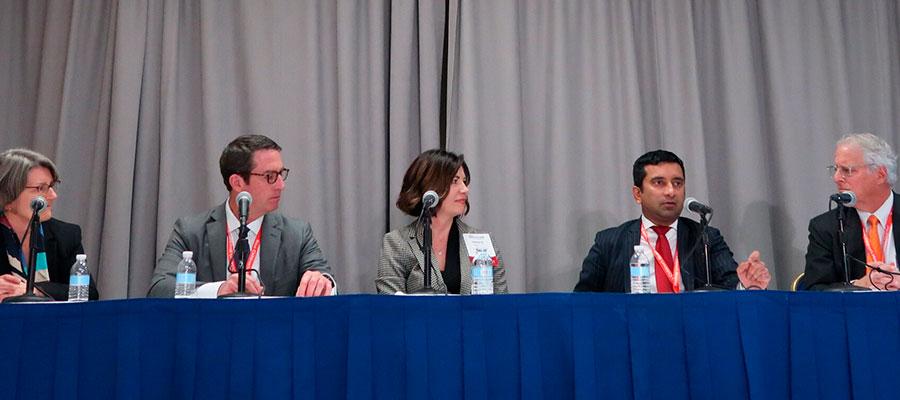Health leaders talk opioids, value-based care at D.C. conference

Pictured, from left: Alicia Jacobs, M.D., vice chair, clinical operations and family medicine at the University of Vermont Medical Center; Christopher Freer, D.O., chairman of the emergency department at Saint Barnabas Medical Center; Halena Gazelka, M.D., director of inpatient pain service at the Mayo Clinic; Jay Bhatt, D.O., senior vice president and chief medical officer for AHA; and moderator Steve Sternberg, assistant managing editor of Health Initiatives at U.S. News & World Report.
Addressing social needs, increasing access to medication-assisted treatment and naloxone, as well as better integrating substance use disorder treatment with physical care are crucial steps hospitals and health systems can and are taking to combat the opioid epidemic, health care leaders said on a panel Nov. 18 at U.S. News & World Report's Healthcare of Tomorrow conference in Washington, D.C.
“If there’s a more integrated system, then people are put in a place where they’re willing to make changes and get help and support making it easier to ensure we support individuals and families through prevention, treatment and recovery,” said Jay Bhatt, D.O., AHA’s senior vice president and chief medical officer, noting that only one in 10 people who need SUD treatment actually receive it. “We need access points to care.”
Joining Bhatt on the panel were Halena Gazelka, M.D., director of inpatient pain service at Mayo Clinic; Alicia Jacobs, M.D., vice chair of clinical operations and family medicine at the University of Vermont Medical Center; and Christopher Freer, D.O., system director of emergency medicine at RWJBarnabas Health and co-chair of its Tackling Addiction Task Force.
Panelists underscored the need for health care organizations to partner with local organizations, law enforcement and other stakeholders to help patients toward recovery. Listening to what matters most to patients, improving access to care and providing transportation to those who may not have it are some ways health care organizations can help patients battling substance or opioid use disorders, the panelists said.
On a different panel today, AHA Board Member John Haupert, president and CEO of Grady Health System in Atlanta, emphasized the importance of maintaining continuity as a patient moves through a health system, using effective care teams and focusing on social determinants of health when working toward value-based care.
Also on the panel were Julie Hall-Barrow, senior vice president of network development and innovation at Children’s Health; Ari Robicsek, M.D., chief medical analytics officer for Providence St. Joseph Health; and Alison Peterson, M.D., vice president of medical affairs at Allina Health’s United Hospital.
Centers for Medicare & Medicaid Services Administrator Seema Verma participated in a closing keynote conversation and panel on defining and measuring success. She also discussed a number of the agency’s recent regulations and priorities.

